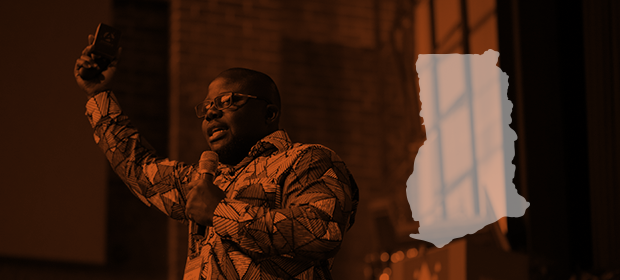Where We Work
See our interactive map


Kafui Prebbie of TECHAiDE, here at SwitchPoint 2018, joined us at the Extreme Affordability Conference and SwitchPoint side sessions in Accra last week. Image courtesy of IntraHealth International.
At the Extreme Affordability Conference in Accra, we saw some of the unusual partnerships and switchpoints that are transforming West Africa’s health and tech landscape.
Nestled on the banks of the Volta River, about 50 miles outside of Accra, Ghana, something big is happening.
Ensign College of Public Health in Kpong is quietly demonstrating how its creative partnership with the government of Ghana, private philanthropists, and the University of Utah can serve as a model for preparing the next generation of global health leaders—and for making extreme affordability a reality.
Extreme affordability—that is, making the highest standard of health care universally accessible and affordable to everyone—could be the key to overcoming extreme poverty and achieving universal health coverage, according to the University of Utah, which coined the phrase through its annual Extreme Affordability Conference in Salt Lake City. This year, they held the event in sub-Saharan Africa, where the need is greatest but the opportunity for progress is palpable.
Ghana and its neighbors are tackling the biggest global health challenges of our day.
I was one of more than 200 people, nearly half of whom were students, gathered at Ensign last week to explore how Ghana and countries throughout West Africa are tackling the biggest global health challenges of our day. Global health thought leaders from the region and from around the world challenged participants to be bold, embrace innovation in all its forms, engage deeply with citizens and patients as true partners in achieving their own health aspirations, and partner with those who see the world differently.
Our friends from Utah had invited IntraHealth International and our SwitchPoint production team to help create an unusual gathering within the event, infusing the academic conference with the creativity, artivism, humanitarian tech, and entrepreneurial energy our annual SwitchPoint conference in Saxapahaw, North Carolina, is known for.
Just like at SwitchPoint, my head was spinning and my heart filled with optimism. My fellow participants were surgeons, internal medicine specialists, public health practitioners, researchers, bench scientists, MBAs, venture capitalists, students, artists, photographers, economists, technologists, industrial designers, school teachers, and others, and we were all focused on the innovations underway by Ghanaians, other Africans, and university faculty and staff.
For example, the University of Utah David Eccles School of Business organized a mini innovation challenge where we role-played as investors who must vote on the top health technology innovation among seven products currently under development. The winner was a low-cost, reusable device designed to use vacuum extraction to immediately stop profuse bleeding following childbirth, one of the leading causes of maternal death.
The runner up was the Umbilikit, a device for home delivery kits designed to safely and effectively cut umbilical cords. This idea came from a doctor who regularly found that razor blades went missing from the home delivery kits because there are so many other uses for them in resource-constrained environments.
Just as we do at SwitchPoint, we organized microlabs where participants could have more hands-on experiences with products and ideas.
Unusual gatherings in unusual places offer insights into how we can do development differently.
I was especially inspired during the microlabs by Ghanaian Jerry Sam of Pensplusbytes. His team spent years developing effective communication technology platforms for citizen engagement to promote free and fair elections across West Africa.
Jerry took on the problem of poor-quality health care by applying these same proven technologies to create an integrated SMS, voice, and web-based tool that enables citizen to report problems directly to the authorities responsible for these services and to use civil society pressure to ensure problems are addressed. His team was able to leapfrog over the design challenges typical in creating new tools, and showed results faster and cheaper.
That’s what we call a switchpoint—when two seemingly unrelated fields come together to produce real results.
Unusual gatherings in unusual places, such as the one at Ensign College last week, offer insights into how we can do development differently and perhaps have greater, more lasting impact. Here are some of my recommendations:
Ensign College not only educates Ghana’s future workforce, but offers top-notch relationships with key country counterparts, strong logistics, and rich insights into the local context. There are growing numbers of indigenous training institutions across sub-Saharan Africa that could host similar events that would raise their profiles and help strengthen their reach and impact.
Over the last nine months of conference planning, I gained a deep appreciation for the breadth and depth of University of Utah’s long-term institutional partnerships across many low- and middle-income countries. As countries face the challenge of addressing the evolving burden of disease—whether by expanding emergency medicine, managing diabetes and hypertension, or understanding US patent law—universities bring incredible assets to countries’ efforts to meet the Sustainable Development Goals.
Creative gatherings don’t need to be costly, high-tech, or in the elite halls of Austin or San Francisco. Ghanaians such as photographer Nana Kofi Acquah and performance artist @steloolive are based in Accra, and are making waves on the global stage. And simple interactions among creative people can be the most powerful. Participants received colorful glass bead bracelets, hand-crafted in the Ghanaian tradition by a group organized by the local queen mother. Throughout the conference, we were encouraged to trade them with someone we didn’t know and strike up a conversation.
Interested in learning about other switchpoints in global health and development? Or better yet, creating your own? Follow IntraHealth and SwitchPoint on social media and join us for SwitchPoint 2019 next April.
Get the latest updates from the blog and eNews




